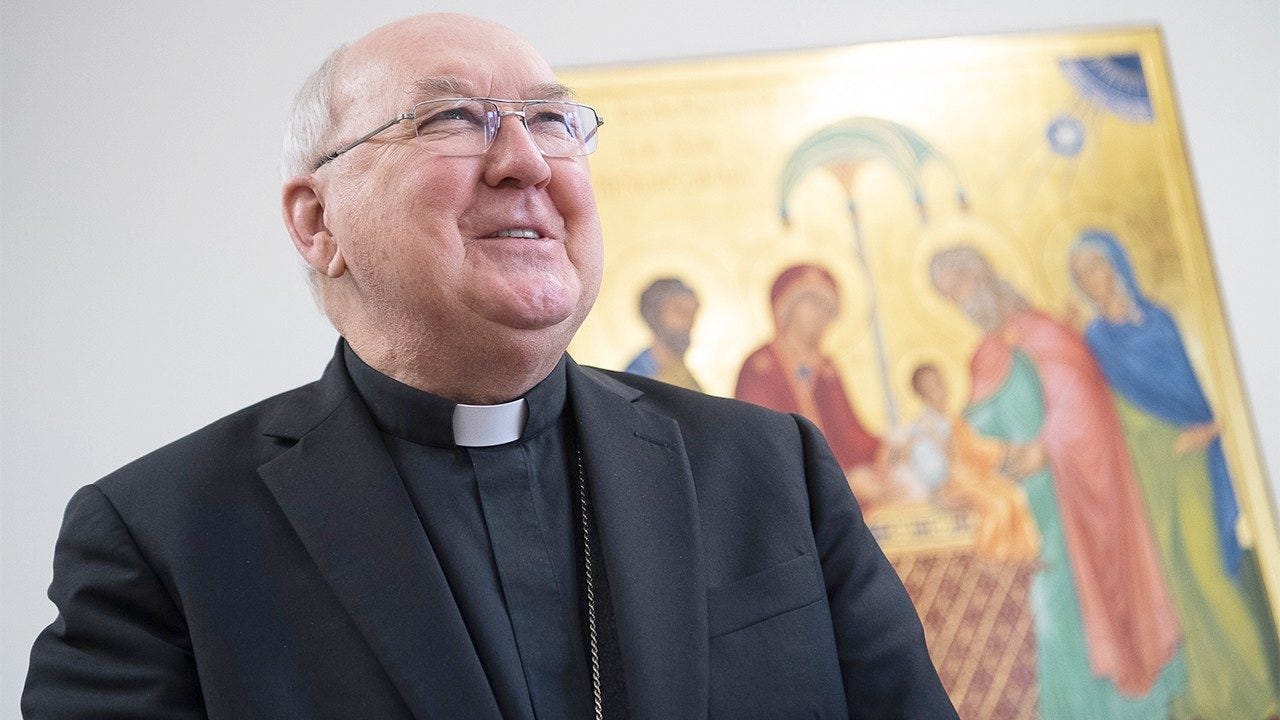Happy Friday friends,
First on everyone’s mind this morning is, surely, the worsening chaos in Kabul, where bombers yesterday took the lives of American military members and scores of Afghans trying to flee the country.
It’s heartrending to watch the situation unfold, and harder still to imagine what, if anything, will be done to help the thousands still trapped there.

Missions of service
Fr. Young talked with us about his service in Afghanistan, the experience of watching the events of the last few weeks unfold, and the real pastoral needs of former servicemen and women.
He told us that “one of the last things that I did before I left the country last year was to baptize an Afghan interpreter,” who wanted to become a Christian.
“I went through kind of a speed course with him, because his life was in danger, going to an unsafe area where he was going to be an interpreter. And so with permission of [the military archbishop], I baptized, confirmed him, and gave him first Holy Communion. And I never saw him again.”
“He didn’t give me his phone number or anything, because he was fearful that he could be tracked through me. So I don’t know where he is now.”
Fr. Young’s concern for the man he brought into the Church is one of we-don’t-know-how-many similar stories this morning. Pray for him, and for them.
You can read the whole interview here. And you should.
—
While you are praying, don’t forget the people of Haiti, who are still in dire need of aid after being hit by first an earthquake and then a tropical storm earlier this month.
Keeping their mission very much in mind, last week we pledged to give the first $10 of every new subscription we got to Mission to the Beloved, a Catholic apostolate run by Haitians and for Haitians. Thanks to your generosity, we’ll be sending them a cheque for nearly $1,500.
And, thanks again to your generosity, the people at Relevant Radio told us this week that they too will be sending a cheque to Mission to the Beloved. So, really, well done.

What is happening in Haiti?
After seeing so many babies die of malnutrition, the sisters were determined to gain the funding necessary to open a small children’s hospital in the city of Sainte-Hélène, which they did.
“In Haiti, everything is a need,” Sr. Martha told us. But the locals now call the hospital “Timoun Kontan.” It means “Happy Children.”
Read about the mission of those Franciscan missionary sisters here.
—
What’s propaedeutic mean, anyway?
“Propaedeutic?”
It’s a year of spiritual and human formation, in which the aspiring priests will be immersed in a life of prayer, interior development, and service to the poor. The men will also be fasting from cell phones and the internet for six days a week, for the whole year.
We talked with Archbishop Cordileone this week. He says he hopes the propaedeutic year will form “a sort of a novitiate for the diocesan priesthood.”
“I don't think a lot of men are really ready for seminary formation when they enter; they need a year basically to detox, to focus on human formation and spirituality in order to prepare them to really reap the fruit of their priestly formation when they enter the seminary,” he told us.
San Francisco is just the latest U.S. diocese to bring in a propaedeutic year (sometimes called a spirituality year) for new seminarians - similar programs are already in place at Denver’s St. John Vianny Seminary, Chicago’s Mundelein, among others.
It’s also a project with serious Vatican backing.
In 2016, the Congregation for Clergy issued a revised Ratio fundamentalis for seminary formation, which included a directive that just such a year help men develop the kind of spiritual chops they will need for their life in formation and ministry.
Ironically, given the growing number of U.S. dioceses launching these programs, Rome’s requirement for a propaedeutic year is apparently behind its delay in approving the USCCB’s latest draft of the national Program for Priestly Formation, with the conference reportedly seeking a bit more flexibility on the subject.
Spare ticket to Mass
This week I got to sit down with MLB pitcher Trevor Williams, formerly of the Chicago Cubs (good) and now, since the worst trade day in living memory, with the New York Mets (bad).

He talked about looking at the fans in the stands, seeing the devotion people have for their teams and asking himself: “Well, why aren't why aren't I dressing up every Sunday? Why aren't I telling everyone ‘Hey, I'm going to Mass today at 7:00 PM. I got tickets to Mass, who wants to go with me? I have an extra ticket.’”
He also talked a lot about humility on the big stage — and humiliation.
“There's always that prayer in the back of your mind, like ‘Jesus, if it is your will, humble me today, but in today's game I would also love seven clean innings. I’d also love to win this game now — maybe I can be humble in other ways after the game and the interview.’
“I don't want to be humiliated on the mound. But sometimes that's what we're called to have happen. When it's happening in the moment, it's hard to find how it is sanctified, right? But it's part of the game; part of the game is failure and it’s how you respond to that failure and how you take up the cross of failure that is going to make you a better player, and a better person.”
Trevor also talked about the work of Project 34, the foundation he set up with his friend and college teammate Cory Hahn, to help those with spinal injuries. Cory broke his neck freshman year sliding into second. Now, Project 34 helps with grants for the kind of hardware needed for independent living. It’s about practical help, but, Trevor told me, it’s also about community.
“Just seeing all these tragedies happen, but having no one lose their spirit or lose their faith is something that helps me love, helps me love more. It's incredible.”
It is incredible. Read the whole thing.
—
Well, we were as intrigued as most people, so we looked into it. Fr. Gabriel Lavery, it turns out, is a member of a group called the Congregation of Mary Immaculate Queen (CMRI) — a group not in the communion of the Church, and with a rather complicated and interesting backstory.
Changingman
In between chasing the news, I have been trying to spend my off hours preparing for the birth of our first child, due on an undisclosed date in the near-to-medium term — but soon enough that there is some preparation to be done.
I’ve mentioned here before that after more than a decade of hoping, we found out we were expecting on the same week that The Pillar launched.
This has been a good lesson in trusting in providence, and believing that everything happens in God’s good time.
While accepting that God provides, some provision still has to be made, practically and spiritually.
On the practical front, I have set myself to assemble a nursery ahead of the arrival, the centerpiece of which is a crib that shipped to us in, roughly, 7,000 pieces.
Self-assembly furniture is one of those things which I cannot understand why we allowed to happen. No one asked us if we wanted this, still less sought our consent, yet putting together furniture with allen wrenches has been taken up as a kind of voluntary corporate penance by our society, like vegan restaurants or Lady Gaga.
Shortly after marrying, I made my first and only trip to Ikea. My mouth still goes dry and my hands shake a little at the memory. I recall the grim march through the claustrophobic mock-ups of apartment living spaces, snaking around like the sets of a dozen bad 90s sitcoms. I remember, too, the special hollowness in the eyes of pallid men in knitted caps who sought for meatballs among the scatter cushions.
But my vision blurs a little after the Inferno-like descent into the warehouse floor, which would have featured in a scene composed by Dante, had he lived to see it.
Anyway, this crib was not from Ikea, but still came with instructions written with a morbidly Scandinavian sense of humor. Maybe the assumption was that it would be assembled in zero gravity. I don’t know, but the project nearly broke my spirit, which, I am told, is good preparation for the first sleepless months of parenthood.
On the plus side, my rage and bloodied fingers spurred me to learn who the eponymous “Allen” might be who created the world’s most useless screwdriver. But, while I now know the real inventor of the hexagonal key is disputed, I’m no closer to fathoming why companies continue to sell furniture exclusively dependent upon them.
As Paul Weller observed: the more I know, the less I understand.
Spiritually, I am not sure what one can, or should do to prepare. The consensus of all human experience is that nothing prepares you for parenthood, and nothing can explain to you how much your whole frame of reference changes in an instant.
But, in these last weeks of relative quiet, I’ve been trying to at least think it through. I’m prepared to love the child beyond what I currently understand my capacity for love to be, even if I don’t know quite what that will mean, and even if I am at least anecdotally aware it will mean parting company with all the daily selfish indulgences I’ve become accustomed to over two decades of childless adulthood. At least I think I am.
One of my favorite homilists is fond of asking, rhetorically, if we really want to convert, to accept God’s plan for our lives, or if we are afraid of how much it might change us.
His point is that we, I, become settled in little habits and vices, content with my own little efforts and rewards. But God wants something much bigger, a total reorientation, a radical departure, a real conforming to the image of his son.
My priest usually rounds off the homily by pointing out that, had I the faintest idea how much my life would change if I really gave my heart to God, I would probably run screaming from the church.
He’s probably right, and that’s probably part of the reason God’s giving me the gift of fatherhood, so my heart can be grown and turned a little more towards him, one diaper at a time. I’m a changing man, or at least I’m about to be, I hope.
See you next week,
Ed. Condon
Editor
The Pillar




